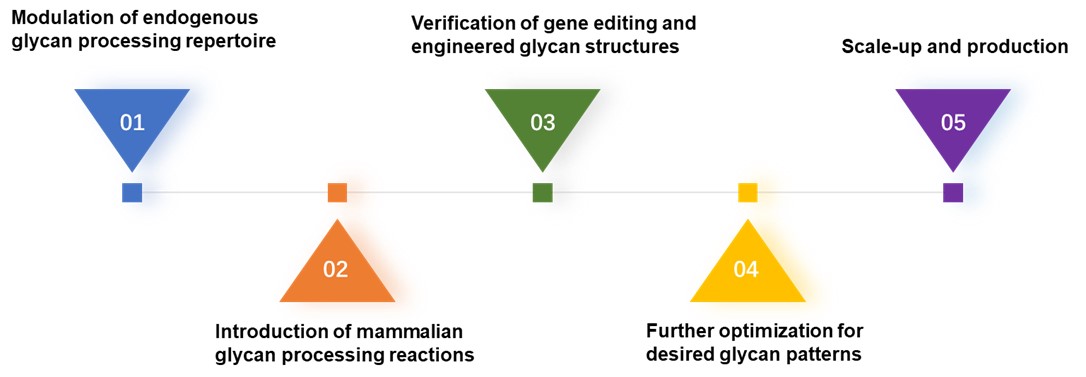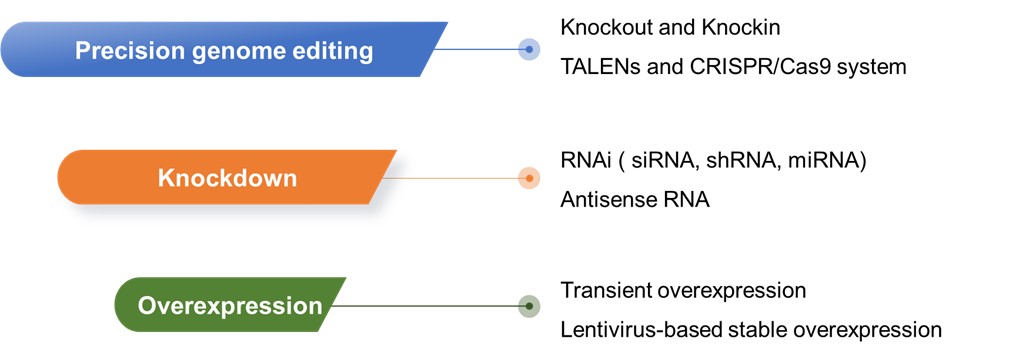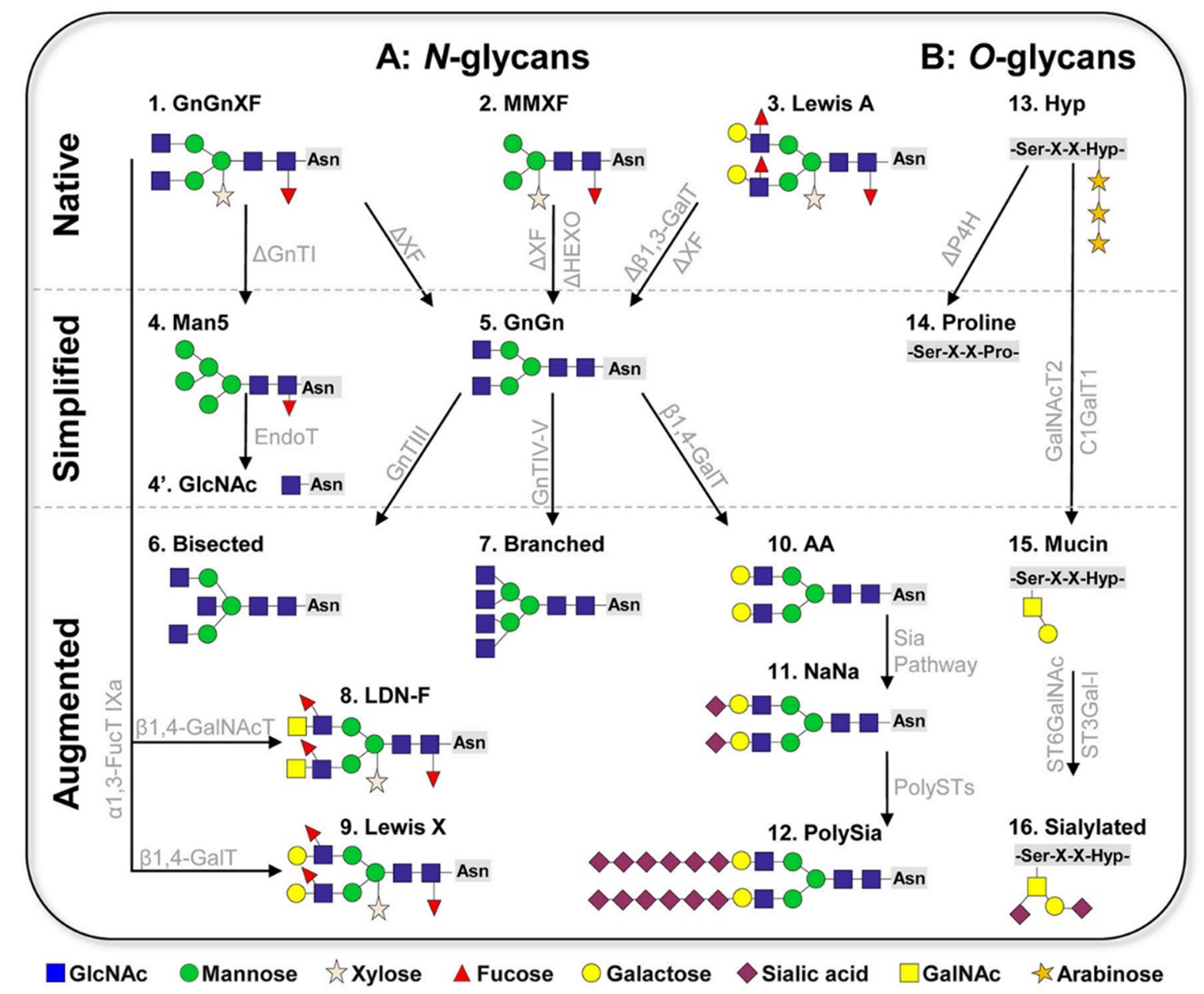Plant Cell Glycoengineering Services
Why Glycoengineering in Plants?
Plants, as eukaryotic expression systems, have emerged as a promising and cost-effective platform for manufacturing recombinant proteins, including therapeutic glycoproteins. They possess the advantage of producing correctly folded human proteins and share similar glycosylation systems with mammalian cells. But, plants can't naturally produce human-type glycan structures. The endogenous glycosylation pathways in plants are considerably simpler when compared to mammals. There are notable differences in N-glycosylation between mammals and plants, especially in the structure of complex glycans. Moreover, plants lack mammalian-type O-glycosylation, such as O-GalNAc. Through glycan engineering, plants can be modified to exhibit desirable mammalian traits while retaining their significant bioprocessing advantages. Notably, the relatively simple glycosylation pathways in plants and their apparent tolerance for heterologous glycosylation pathways offer promising opportunities for the creation of customized glycosylation systems with a high degree of flexibility and precision.
Plant Cell Glycoengineering Services at Creative Biolabs
As a prominent provider of expertise and services in the field of Cell Line Glycoengineering, Creative Biolabs has developed comprehensive glycoengineering platforms for both N-linked Glycoengineering and O-linked Glycoengineering in plants. These platforms involve the strategic modulation of intact plant cell genomes to generate new cell lines with desired traits for recombinant glycoprotein production. Engineering strategies in our laboratory mainly include the modulation of plant endogenous glycosylation pathways, such as the removal or inhibition of particular enzymes responsible for undesirable glycan structures, and the introduction of additional enzymes involved in mammalian glycosylation pathways. These enzymes enable the synthesis of non-native and human-like glycans within the plant host. We employ optimal strategies that are tailored to the specific host plant species and designed to achieve the most practical and efficient approach for obtaining the desired glycan profiles.
 Fig.1 Workflow of our services in plant cell glycoengineering.
Fig.1 Workflow of our services in plant cell glycoengineering.
Our Technology Platforms for Plant Cell Glycoengineering
Creative Biolabs utilizes a range of cutting-edge Genetic Techniques to facilitate precise gene manipulation and glycosylation engineering in plant cells. We offer site-specific modifications of plant genomes, including gene knockout and knockin techniques. We leverage RNAi and antisense RNA technologies to down-regulate the expression of target genes. Furthermore, we employ transient and stable overexpression methods to enhance the expression of specific genes in plant cells. By combining these molecular techniques with our intelligent glycoengineering strategies, we can precisely manipulate glycosylation processes in plant cells to produce glycoproteins with tailored glycan structures.
 Fig.2 Our technology platforms for plant cell glycoengineering.
Fig.2 Our technology platforms for plant cell glycoengineering.
Features of Our Services
-
Advanced techniques for effective gene modifications
-
Optional glycoengineering strategies for the humanization of glycans
-
Customized glycoengineering and manipulating for specific glycoprotein products
-
Professional team with extensive experience in glycoengineering
Published Data
Technology: Plant cell glycoengineering
Journal: Frontiers in Bioengineering and Biotechnology
IF: 6.064
Published: 2018
Results: The elimination of undesired native glycosylation enzymes allows for the specific modulation and improvement of the efficacy of therapeutic glycoproteins. Expanding the endogenous glycosylation capabilities by overexpressing heterologous glycosylation enzymes has enabled the production of well-defined complex glycans.
 Fig.3 Schematic overview of plant-based glycan engineering.1, 2
Fig.3 Schematic overview of plant-based glycan engineering.1, 2
Armed with advanced technology platforms for genetic glycoengineering, Creative Biolabs has developed comprehensive glycoengineering services in plant cells for the production of recombinant glycoproteins with well-defined glycan structures. If you have any glycoengineering needs or specific requirements, please feel free to contact us.
References
-
Montero-Morales, Laura, and Herta Steinkellner. "Advanced plant-based glycan engineering." Frontiers in Bioengineering and Biotechnology 6 (2018): 81.
-
Under Open Access license CC BY 4.0, without modification.
For Research Use Only.
Related Services

 Fig.1 Workflow of our services in plant cell glycoengineering.
Fig.1 Workflow of our services in plant cell glycoengineering.
 Fig.2 Our technology platforms for plant cell glycoengineering.
Fig.2 Our technology platforms for plant cell glycoengineering.
 Fig.3 Schematic overview of plant-based glycan engineering.1, 2
Fig.3 Schematic overview of plant-based glycan engineering.1, 2

